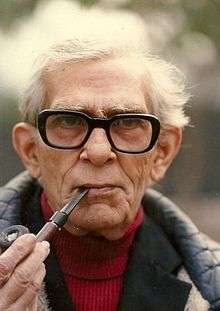Mushtaq Ahmed Azmi
| Mushtaq Ahmed | |
|---|---|
 Shri Mushtaq Ahmed | |
| Born |
1 June 1919 Rajapur Sikror, Azamgarh, Uttar Pradesh, India |
| Died |
12 July 2011 (aged 92) New Delhi |
| Alma mater |
Aligarh Muslim University Michigan State University |
| Occupation | Mass literacy expert |
Mushtaq Ahmed Azmi (1 June 1919 – 12 July 2011), was a mass literacy expert. He was one of the first non-officials to be associated with the development of Adult Education program in India from the early 1950s, and was an early leader of the mass literacy movement. As an officer of UNESCO, he was posted in Africa and seconded to lead mass literacy programs in Nigeria and Zambia. He was offered a position in the UNESCO by the British diplomat and head of fundamental education at UNESCO John Bowers.
During his sixty-year career, he conducted a number of studies and wrote books and technical documents, which are used by experts and activists in the field of adult education.
He developed control, monitoring and evaluation systems for national literacy programs such as Total Literacy Campaigns (TLC) and Post Literacy Programs (PLP), and was an advocate of lifelong learning.
Eaerly life and education
Azmi was born in the village of Rajapur Sikror, Saraimeer Azamgarh district, Uttar Pradesh. His early education was in Burma. After separation of Burma from India in 1935 he came to India and enrolled at Jubilee College in Lucknow. He completed a graduate programme from Aligarh Muslim University and finally Masters in Communication Arts from the Michigan State University in 1964. He was on a UNESCO fellowship program in 1954.[1]
Career
He was initially employed with the Railways and Bridges Department in the United Provinces of British India. Dr. Zakir Hussain, an educationist who later became India's third President, exhorted the educated youth to leave Colonial service and join nationalist institutions like the Jamia Millia Islamia. Azmi resigned, and became the Secretary of the Adult Education Department of Jamia Millia.
He founded, revived, mobilised and headed many institutions related to adult, primary and continuing education. Following is a brief career summary.
- 1951–1955 Secretary, Adult Education Department, Jamia Millia Islamia, New Delhi
- 1956–1957 Assistant Director, UNESCO group training scheme (For training international literacy experts) Mysore
- 1958–1960 Director Research, Training and Production Center, Jamia Millia Islamia[2]
- 1960–1964 Director, Literacy House, Lucknow[3]
- 1965–1978 UNESCO Adviser in adult literacy to the governments of Nigeria, Zambia etc.[4][5]
- 1978–1981 Director, Center for development of women and youth, Aligarh
- 1982–1984 Director, State Resource Center, Jamia Millia Islamia
- 1990–1993 Director, Literacy House, Lucknow
- 1995–1999 chairman, National Institute of Adult Education, Ministry of HRD, Govt. of India, New Delhi[6]
- 1996–2001 chairman, National Core group, External Evaluation of TLC/PLP, Ministry of HRD, Govt. of India, New Delhi[5]
- Chairman Krishi Vigyan Kendra (KVK) Sitapur and Jan Shiksha Sansthan (JSS) Handi
Publications
Azmi wrote a number of publications related to adult education, some of them which serve as reference material[7] for researchers and scholars are mentioned below.
- Survey of reading materials for Neo-Literates, RTP, Jamia Millia Islamia, 1958
- How to write Primers for Neo-Literates, Directorate of Adult education, Government of India, 1982
- A study of the relationship between the Period of learning and level of literacy and reading interests of neo-literates, IAEA, New Delhi, 1987
- Methods of teaching reading to Adults, SRC, Jamia, 1989
- Impact of population education on the learners of adult education programme, SRC, Jamia 1990
- How to Evaluate learning outcomes of TLC districts, National Literacy mission, 1996.
- How to write primers for adults, Directorate of adult education, New Delhi,1979[8]
- Equivalency of New Literates vis-a-vis primary school students, 1997.
- Survey of knowledge, opinion, and attitude of literate/non-literate adult regarding ICPD paradigm shoft, Directorate of Adult education, 1998
- Story of Adult Education, Jamia Millia Islamia, SRC Jamia, 2001.
- Participation of Muslims, particularly Muslim women in Total Literacy Campaign, SRC, Jamia 2001.
- An evaluation of Reading Materials for Neo-literates and a Study of their Reading Needs and Interests, JMI, 1958[9]
Awards
Azmi was a recipient of the Nehru Literacy Award in 1984 conferred by the Indian Adult Education Association (IAEA) given for outstanding contribution for adult literacy. In 1997 the Indian government's Ministry of Human Resource Development conferred on him a National Award for Literacy, in recognition of his outstanding lifetime services to the cause of promoting mass literacy in India.
References
- ↑ http://unesdoc.unesco.org/images/0012/001261/126110EB.pdf
- ↑ "Reports and minutes of various committees in which Dr.Mushtaq Ahmed was a member". Education.nic.in. Archived from the original on 16 April 2009. Retrieved 18 December 2011.
- ↑ "Ministry of HRD, Govt. of India". Education.nic.in. Archived from the original on 21 May 2006. Retrieved 18 December 2011.
- ↑ "The Role of Universities in the Promotion of Literacy in Africa". The Nigerian Observer. 1 May 2011. Archived from the original on 4 October 2011. Retrieved 11 August 2011.
- 1 2 "Planning commission of India". Retrieved 18 December 2011.
- ↑ "International Institute for adult and lifelong education". Iiale.org. Retrieved 18 December 2011.
- ↑ http://www.scert.kerala.gov.in/images/2013/SCERT_LIBRARY_REPORT.pdf
- ↑ "Used as ref in MA (Adult and lifelong education) Andhra University". Docs.google.com. Retrieved 18 December 2011.
- ↑ "Research in Adult Education A Trend Report : S.C. Bhatia". Education.nic.in. Archived from the original on 8 November 2011. Retrieved 18 December 2011.
External links
- https://web.archive.org/web/20160813110657/http://iaea-india.org/images/pdf/iaea_newsletter/jan12.pdf
- https://web.archive.org/web/20111004015436/http://dspace.vidyanidhi.org.in:8080/dspace/bitstream/2009/5567/8/KER-1988-101-Bibliography.pdf
- http://catalogue.nla.gov.au/Search/Home?lookfor=subject%3A%22New+literates%27+writings.%22&type=all&limit%5B%5D=&submit=Find&filter[]=author-cluster:%22Ahmed%2C%20Mushtaq%22
- https://books.google.com/books?id=qotm3f_-iZgC&pg=PA153&lpg=PA153&dq=Mushtaq+Ahmed+adult+education+india&source=bl&ots=cSdgZTRDTa&sig=V8BqzRG3A3NzvUXtSOGXCXCv__s&hl=en&ei=SiIfTr3TGcLhrAeFlLWTBQ&sa=X&oi=book_result&ct=result&resnum=10&ved=0CFMQ6AEwCQ
- The standards, time periods, and ... – Mushtaq Ahmed – Google Books. Books.google.co.in. Retrieved 18 December 2011.
- http://ncw.nic.in/pdfreports/SHG%20final%20report%20in%20Himachal%20pradesh.pdf
- http://planningcommission.nic.in/reports/sereport/ser/stdy_landall.pdf
- http://unesdoc.unesco.org/images/0003/000300/030008eo.pdf